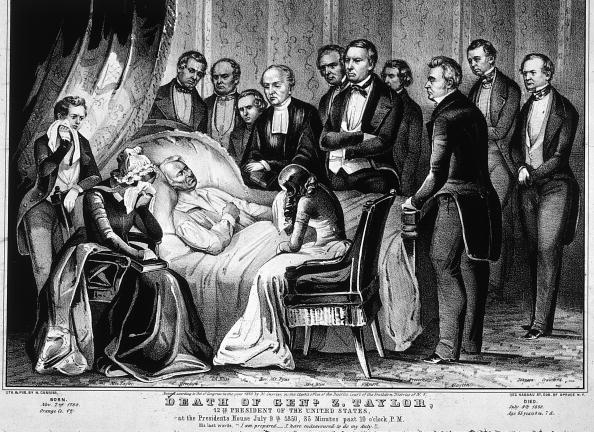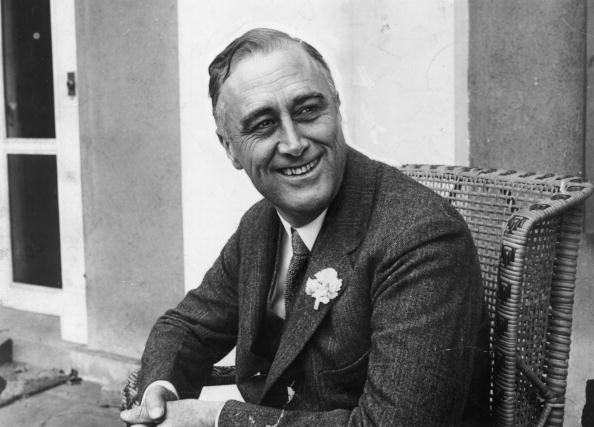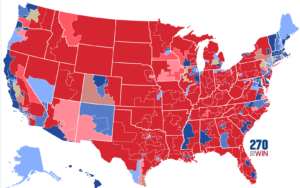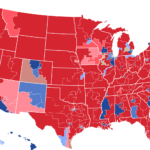On September 11 of this year, presidential candidate Hillary Clinton collapsed due to complications from pneumonia. She was healthy and back on the campaign trail a week later, but the incident put the spotlight on a topic that had been making the rounds of many news network—the health of a president.
While leadership, calm demeanor and political experience are often touted as necessary characteristics of a president, being healthy, and making it through an elected term, is just as important. While it hasn’t happened often, several American presidents have died before their terms ended. And it had ramifications—of varying degrees—on the history of our nation.
The first president to expire before his work was done, was William Henry Harrison. The ninth president was a former military officer. He had built up a tough exterior from years of service, where inclement weather was never an issue. However, that tolerance to poor weather was when he was a younger man. When he became president he was 68-years-old.
The Health of a President
Coincidentally during his inauguration speech, it was a chilly and rain filled day. Unfortunately, this wasn’t much of a concern for Harrison. Meaning he was not properly attired for this sort of weather. The result was catching a chill that day and eventually developing pneumonia.
Regrettably, medicine at that time was not as effective at treat pneumonia as it is today (and was for Secretary Clinton). Physicians for the president were so desperate to heal Harrison, that they tried such techniques as using suction cups to draw out the ailment, bloodletting, and Native American therapies that called for the use of a snake. It was all for naught. William Henry Harrison passed away several days after he took office.
His successor was John Tyler. John Tyler, a Virginia congressman, did not leave a positive lasting memory during his tenure. He did prove the systems in place—for the eventuality of a president not finishing his term—were viable, and the transition went smoothly.
However, he did have an agenda of his own that differed from Harrison’s. And because of this, it caused much friction with other bureaucrats during his presidency. As a former slave owner, and being pro states’ rights, he was not in touch with a nation evolving (especially in the northern states) away from that in the early 1800’s. His tenure was not a very successful one.
The next president to kick the bucket, before he could finish his tenure, was Zachary Taylor. Our twelfth president was the victim of cholera morbus. After taking part in fourth of July celebrations, Taylor took a walk on the edges of the Potomac River. It was a very hot day, and the Mexican-American War hero needed to refresh. He had a glass of ice water and ate some fruits.
Sadly, he developed stomach pains that lasted for the next five days. Cholera morbus is defined as an “acute severe gastroenteritis.” Taylor did not recover and died on July 9 of 1850.

His replacement in office would be Millard Fillmore. Fillmore was handed a tough situation. The abolishing of slavery was gaining serious steam. Fillmore tried to appease the different political parties of the time, through a finalized version of the compromise of 1850. In attempting this, few parties were satisfied. And as the leader of the anti-immigration Know-Nothings party, he already had many political detractors. His tenure as president did little to change that.
Warren G. Harding is often viewed by many as the worst president in history. But that had nothing to do with him dying in office. That probably helped in belaying any more damage to his reputation. The twenty ninth president fell ill from food poisoning, while on the road for a speaking tour. The Ohio politician once admitted to confidants that the job was “beyond him.” His unfortunate death seemed like a slice of mercy for a man in over his head.
However, his successor—Calvin Coolidge—did not make a strong case towards reinvigorating the reputation of the Harding regime. By the end of his second term his policies were being blamed for pushing the country towards the great depression. Also of note, is Coolidge’s approach to foreign policy in Europe did little to stunt the rise of the Nazi Party.
The former Massachusetts governor was once a popular figure inside the political arena. By the time he left office he was viewed as a scape goat for one of the most economically difficult times in American history.
While the likes of Harrison, Taylor and Harding received mixed reviews from historians, Franklin D. Roosevelt is viewed much more favorably. The thirty second president used his “new deal” to bring the country out of the great depression, while also building it up into a super-power during World War II.
Although, throughout his multi-term presidency, Roosevelt often battled health issues. He already had the debilitating disease of polio for years. But by the early months of 1945, he had developed high blood pressure (understandably so), heart ailments, and bronchitis. He would die just a few months into his fourth term. And he would not see the end of WWII.
While the likes of Harrison, Taylor and Harding received mixed reviews from historians, Franklin D. Roosevelt is viewed much more favorably.
The man that would succeed Roosevelt, and lead the US to the end of the war, was Harry S. Truman. The Missouri senator had major shoes to fill. History often remembers Truman as the president who dropped two nuclear warheads on Japan. The necessity of using that ultimate weapon, to end the war in the pacific, is still debated to this day.
Also noteworthy, during Truman’s time in office, was the rise of McCarthyism. Senator Joseph McCarthy’s witch hunt to root out communist sympathizers was a divisive movement in the nation. And Truman did not make a point of curtailing it.
Along with getting the US involved in the Korean War, Truman’s tenure was viewed as a disappointing B-Side to the major progress Roosevelt had made before him.
Because of the passing of several presidents, and the assassinations of a few others, candidates for the office are often expected to publicly release their medical records. It has become an unofficial part of the race for the most important position in the country.
The idea of medical records being made public, as a necessity for a presidential run, was posed to a group of possible voters for this story. They were asked, “What are your thoughts on the releasing of medical records being an unofficial requirement of presidential candidates?” Their anonymous answers varied from apathy, to serious interest. Here are some of those answers:
“Should be required, I’d like to know if I am voting for the president or vice president at that point.”
“I don’t have a problem with it being an unofficial requirement, because I don’t think it’s fair to bar someone from running because of a health issue. However, their health matters because you don’t want to elect someone, and then someone else winds up the President in short order, because said health issue makes them unable to do their job.”
“Well it gives us a heads up if they are going to be healthy through their entire term. Some illnesses can be life and career changing. Wouldn’t want anything like that happening two years into one’s term.”
“It really doesn’t matter.”
While it is not the main focus of an election, the personal health of candidates does matter. History has shown the presidency is invulnerable to the unpredictability of life. And the person that takes that position, often doesn’t live up to the potential of the person originally elected for the role.
So when a person chooses to vote for president, they have to realize, they are not voting just for the names at the top of the bill, but the ones right underneath them as well. The health of an aging person can be a very fickle thing.













